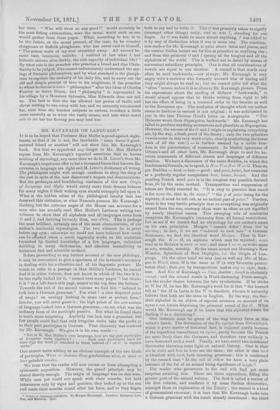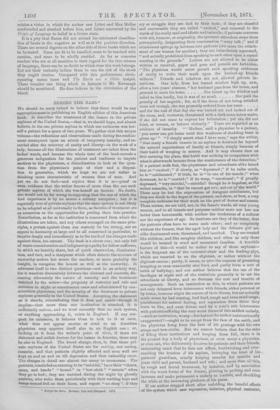MR. KAVANAGH ON LANGUAGE.*
IT is to be hoped that Professor Max Muller is proof against night- mares, or that if he is not, the inevitable "some damn'd good- natured friend or another" will not show him Mr. Kavanagh's book. Not that we apprehend any danger to Mr. Max Miiller's repose from Mr. Kavanagh's repeated assertions that be knows nothing of etymology, any more than we do to M. Littr6's from Mr. Kavanagh's impetuous offer to bet a thousand francs that his own dis- coveries in language are right and M. Littr6's dictionary all wrong. The philologists might well enough continue to sleep the sleep of the just in spite of the new discoverer's wagers and denunciations. But the grotesque and bewildering confusion of this now Origin of Language and Myths would surely make their dreams hideous for many nights if their waking eyes should unhappily fall upon it. What is the hidden crime of the philological faculty that has deserved this visitation, or what Nemesis pursues Mr. Kavanagh? Nothing but the extreme anger of the Muses can account for a man who has actually read Max Miiller's Lectures writing two volumes to show that all alphabets and all languages come from 0 and 1, and deriving barracks thus, war-o7x4. This is perhaps the most brilliant, certainly one of the most characteristic, of our author's incidental etymologies. The two volumes lie in print before our eyes ; otherwise we could not have believed how much can be effected when a crude ingenuity works on the materials furnished by limited knowledge of a few languages, unlimited dabbling in many dictionaries, and absolute insensibility to historical fact and scientific method.
Before proceeding to any further account of the new philology, it may be convenient to give a specimen of the inventor's accuracy in dealing with his authorities and of his linguistic powers. He wants to refer to a passage in Max Miiller's Lectures, he cannot find it in either volume, does not know in which of the two it is ; he has really looked for it, "turned over many pages "1 but thiuks it is "on a left-band-side page, nearer to the top than the bottom." Towards the end of the second volume we find him "induced to look into a German grammar." For what ? a nice disputed point of usage? an analogy lurking in soma rare or archaic form ? Reader, you will never guess it ; the high priest of the new science of language looked into a German grammar,—to see what was the ordinary form of the participle passive. But what he found there is much more surprising. Anybody can look into a grammar, but few people could find that only irregular verbs take the prefix ye to their past participles in German. That discovery was reserved for Mr. Kavanagh. We give it in his own words :—
"But in M. Max Miller's own language, how are the past participles of irregular verbs signified ? Such past participles have for their sign the word ye attached to them, instead of t or et in regular verbs."
One cannot resist adding as an obvious example of the two kinds of participles, Wenn so dummes Zeug geschrieben wird, so muss es • hart getadelt ?verde?? . We trust that the reader will now excuse us from attempting a systematic exposition. However, the grand principle may be stated shortly enough. The origin of language was on this wise. While men yet could not speak with their mouths, but held intercourse only by signs and gestures, they looked up at the sun and made their mouths round after his form, and so they began
* On of Lan page and.ifylla. By Morgan Kavanagh. London: Sampson Low, Son, and Marston. 1871. both to say and to write 0. This 0 was presently taken to signify (amongst other things) unity, and so was I, standing for on finger. As 0 was liable to mean almost anything, I was added to' it by way of distinction when it was to mean one. The combina- tion made a for Mr. Kavanagh is quite above dates and places, and the cursive Italian letters are for hiin as primitive as anything else ; and from this primeval 0 and 1 sprang all the tongues and all the alphabets of the world. This is worked out in detail by means of convenient subsidiary principles. One is that all combinations of vowels are equal to one another. A second is that words may often be read backwards,—not always ; Mr. Kavanagh is very angry with a reviewer who formerly accused him of having said they might always be read so ; but we cannot quite tell what the "often" moans, unless it is as often am Mr. Kavanagh pleases. From his expressions about the reading of Hebrew "backwards," it would almost appear that he thinks writing from right to left has the effect of being in a reversed order to the Semitic as well to the European eye. The confusion of thought which our author seems to harbour in earnest is not original ; it was anticipated in jest in the late Thomas Hood's letter on Autographs. "The Hebrews wrote their Shpargotua backwards." Mr. Kavanagh has failed to produce anything so sonorous and plausible as Shpargotua. However, the success of the 0 and 1 origin in explaining everything see, by the way, a fresh proof of the theory ; only the two primitivo vowels occur in this very word origin, clearly symbolizing the lower rank of all the rest!) — is further assured by a noble free- dom in the permutation of consonants. In blissful ignorance of Grimm's and all other laws, Mr. Kavanagh skips to and fro be- tween consonants of different classes and languages of different) families. We have a discussion of the name Buddha, in which the fundamental formula, so to speak, is IL= F= B= W=. G. Thus we get Buddha = boot = foot = good ; and good, better, best come out as a perfectly regular comparison boot, booter, bootest. And the' puzzling French word gars is in the simplest way possible derived from fits by the same method. Transposition and suppression of letters are freely resorted to. "It is easy to perceive that month is for moon-the, that is, the moon ;" "the p of pater being for the aspirate, it must be left out, as no radical part of pater." Further; there is the very fertile principle that as everything was originally named from the sun, contrary ideas were as often as not signified by nearly identical names. This sweeping rule of contraries completes Mr. Kavanagh's immunity from all formal restrictions. Let us see if we cannot find an etymology for our author's name on his own principles. Morgan "cannot differ" from /nor morning ; in fact, if we are "induced to look into" a German dictionary, we find the identical word Morgen. Then in Kav- anagh the K = an aspirate which may be rejected ; ava:t read as in Hebrew is nava = new ; and since b = w, ag is the same as awe, wonder, worship. So the name comes out Morning's New Wonder, Splendour of New Daylight, i.e. the Origin of Lan- guage. On the other hand we may just as well say Mor of Mor- gan is 1Vord, since .31 is the same as W (a very favourite permu- tation this) ; then gnu by transposition makes nag = night, dark- ness. And Kay of Kavanagh = Caw, chatter ; anagh is obviously enough ; and the second result is Word-darkening Prate-enough. Let the reader choose between the two symbolisms. If he stick. at W for /12, he has Mr. Kavanagh's word for it that "the learned tell us" the Min Latin is the IV in Saueltrit, whence it naturally
follows that both are the same in English. By the way, the San- skrit alphabet is an object of especial aversion on account of its squar o-cut letters disguising the primeval round of the 0. What would Mr. Kavanagh say if he knew that this alphabet treats his darling 0 as a diphthong ?
One instance must be given of the way history fares at this writer's hands. The derivation of the Fr. espiegle from Eulenspiegel, which is pure matter of historical fact, is rejected partly because of the superficial resemblance to espio it, partly because the French are more lively than the Germans, and therefore very unlikely aa have borrowed such a word. Finally, we have noted two incidental discoveries throwing some light on natural history. One is that aim in simia and horn in /tom are the same ; the other is that lord is identical with lard, both denoting greatness ; this is confirmed by the remark that "In the tall of tallow we have a very plaits instance of the fat of an animal being significant of height."
The reader who perseveres to the end will find yet more surprises awaiting him. There are three appendices, filling the greater part of the second volume. The first is called a review of the first volume, and confirms it by some further discoveries, amongst them an explanation of the Trinity : the second is a kind of grammatical excursus; it is here that Mr. Kavanagh looks into a Germau grammar with the result already mentioned : the third relates a vision in which the author saw Littrd and Max Muller confounded and abashed before him, and Littrd converted by the Origin of Lmiguage to belief in a future state.
It is a pity that Bacon did not extend his celebrated classifica- tion of books in the negative as well as in the positive direction. There are several degrees on the other side of those books which are to be tasted. Some are fit to be handled, some to be touched with caution, and some to be wholly avoided. As far as concerns readers who are at all sensitive in their regard for the true science of language, there can be no doubt to which class this work belongs. Let not their curiosity induce them to run the risk of the shock they might receive. Compared with this performance circle. squaring seems tame and The Earth not a Globe insipid. There remains one thing which in fairness to Mr. Kavanagh should be mentioned. He does believe in the circulation of the blood.



































 Previous page
Previous page